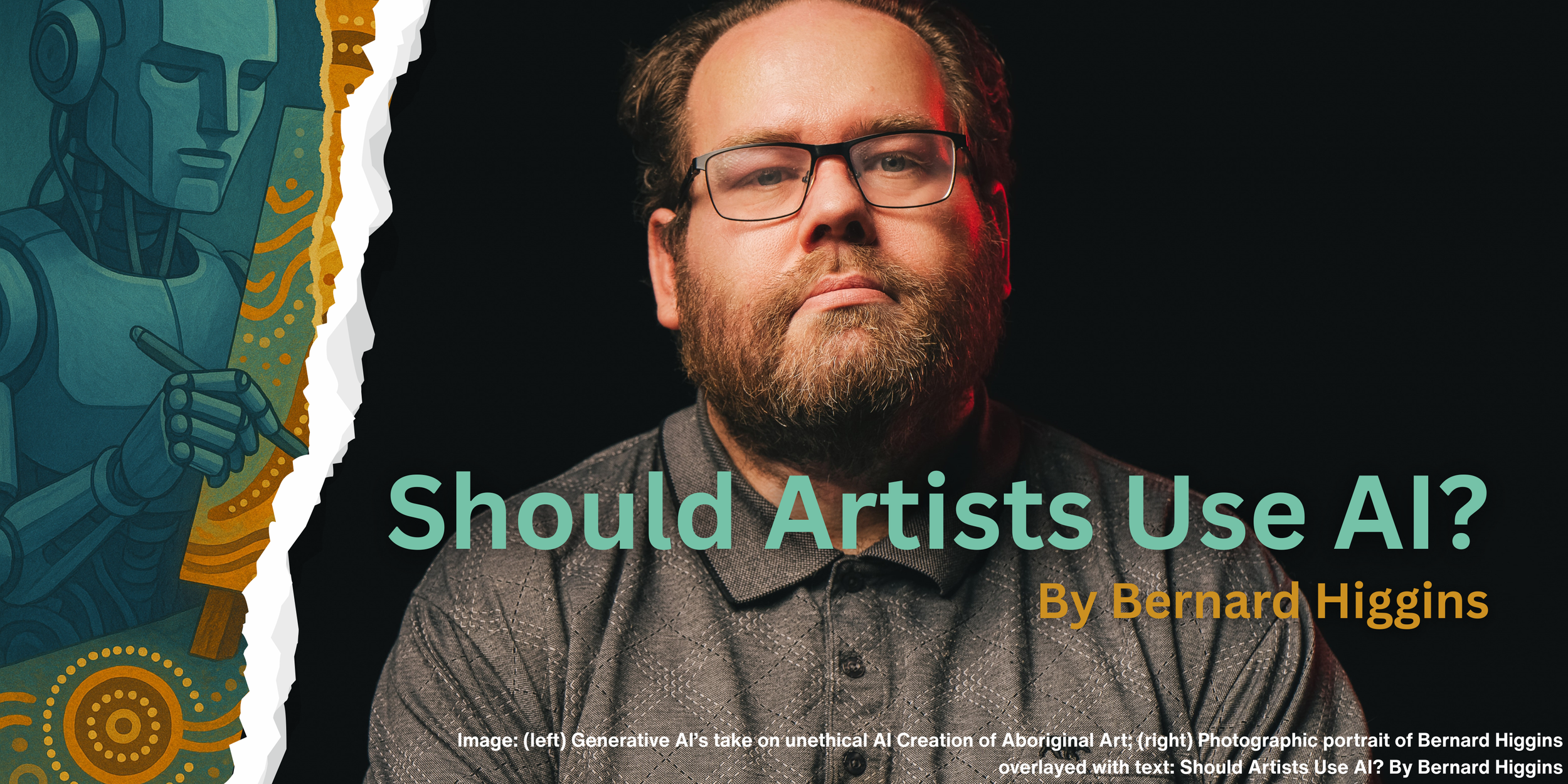Spotlight Series July 2025: Should Artists Use AI?
Spotlight Series
July '25
Should Artists Use AI?
Griffith | Leeton | Murrumbidgee | Narrandera
You have probably seen it: surreal AI-generated cats in Victorian costumes or entire novels written in seconds. But where do artists stand in all this? I am personally guilty of following a lot of Instagram pages of AI created content of cats. But should we as artists use or support AI? Ethically, should we even do so?
Full disclosure, I use AI. I feel a lot of us do. But admitting it feels wrong because of all the issues we have all heard about.
How it has been trained on pirated creative works: novels, paintings, digital art, anything – the large AI companies have all pirated it for training the AI. I am friends with the author, Anita Heiss, who had 17 of her novels pirated for AI training. And there are currently 50,544 signatories on the website https://www.aitrainingstatement.org/ in support of the statement “The unlicensed use of creative works for training generative AI is a major, unjust threat to the livelihoods of the people behind those works, and must not be permitted.”
Companies like Meta and Microsoft have faced criticism for allegedly using copyrighted material without permission in training their AI systems. [1] [2] Two companies that you could reasonably argue would be in a financial position where they should pay artists properly for the use of their works.
When I use AI though, I am not writing creative content with it or getting it to churn out novels that I then claim as my own work. I am using it as a tool to assist me in editing documents, doing administrative tasks, and applying for grants. Everything it generates I proofread and, in most cases, further edited because it always misses some nuance that I want included.
Even when I use AI in grant writing, I treat it as a collaborator, not a personal grant writer. I craft detailed prompts and edit every output to ensure it reflects my voice, values, and the nuances of the work. This is because ultimately, I’m still the artist applying for the grant.
Thus, in my opinion I am using a tool that exists to make my life easier. We all know as artists that we are forced to spend a disproportionate time writing grant applications when compared to the process of creating our art. But does this still answer the question, “Does this make using AI ethically OK?”
This is a hard question to answer and one I think the art world will be debating for years to come. Especially when we include considerations such as: art jobs being lost or displaced by AI content; people not valuing our time and effort because AI can just generate something “good enough” in seconds that would take us much longer to create; the issue of cultural IP and sensitivity when a non-Indigenous person just has an AI app create an “Aboriginal” style painting; and of course the real issue of there being no human touch or human authenticity to any of the artwork.
While being aware of these issues and much more we do also have to consider the positives. The quickness can allow us artists to explore our ideas quicker, create faster iterations of drafts before we land on the version we prefer, which can increase our productivity. Or we can bridge gaps in our skills or create assets or parts in our art creation pipeline that were historically bottlenecks because we were forced to do things we just weren’t good at, or capable of. And of course, the previous example of speeding up laborious tasks such as editing and administration.
Ultimately, I think this decision needs to be up to each of us as individual artists. But make it an informed decision. Research AI, research each company, make sure you are comfortable with what, and who, you are working with. I have seen some people make the comparison to previous technological advances such as the camera. Like when photography challenged painting, AI challenges us to rethink what art is and who gets to make it. But it should never replace the artist.
[1] https://theconversation.com/meta-allegedly-used-pirated-books-to-train-ai-australian-authors-have-objected-but-us-courts-may-decide-if-this-is-fair-use-253105
[2] https://www.theguardian.com/technology/2025/jun/26/microsoft-ai-authors-lawsuit
Written by Bernard Higgins, Western Riverina Arts Digital Arts and Projects Officer
Graphic: (left) Generative AI’s take on unethical AI Creation of Aboriginal Art; (right) Photographic portrait of Bernard Higgins (provided) overlayed with text: Should Artists Use AI? By Bernard Higgins
Please note: The Spotlight Series features original ideas, themes and writing, entirely the work of each featured contributor. Western Riverina Arts may use AI tools to assist with spelling and grammar where needed.





